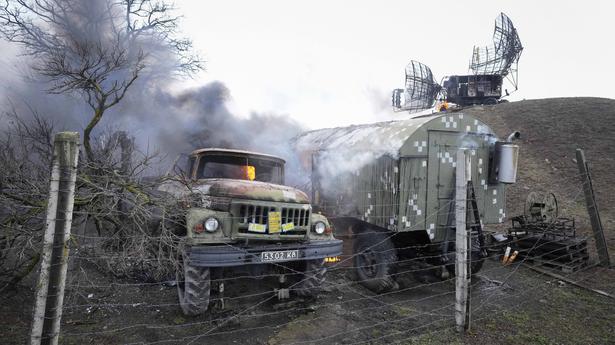
The Russian Aggression on Ukraine and International Law
The Hindu
What principles of International law are Russia breaking by its actions in eastern Ukraine?
The story so far: The annexation of Crimea in 2014 by Russia, following the removal of Victor Yanukovych as the President, was the first major military flare-up in the Russo-Ukrainian relations. The Crimean annexation by Russia was met with imposition of sanctions. However, Russia is still in occupation of Crimea, and post 2014 its activities have centred around fomenting separatists in eastern Ukraine. In January 2021, the Ukrainian President Volodymyr Zelensky appealed the U.S. to let it join NATO, following which Russia started amassing troops near the borders of eastern Ukraine. Tensions escalated quickly from December 2021 when Russia demanded NATO to give up its military activities in eastern Europe and Ukraine, followed by a Russian cyberattack on the Ukrainian government website. On 22 February, Russia recognised the self-declared Donetsk and Luhansk republics in the Donbass region of eastern Ukraine, and sent Russian troops to these territories. Finally, yesterday Russia launched a full-scale invasion on Ukraine. The Russian actions have been condemned widely and raise several questions concerning violation of international law.
The principle of non-intervention in domestic affairs is the foundational principle on which existing international order is based. The principle is enshrined in article 2(4) of the UN Charter requiring states to refrain from using force or threat of using force against territorial integrity or political independence of any state. It prohibits any kind of forcible trespassing in the territory of another state, even if it is for temporary or limited operations such as an ‘in and out’ operation. The Russian attack on Ukraine is violative of the non-intervention principle, and amounts to aggression under international law.
The UN General Assembly Resolution 3314 (1974) defines aggression as the use of armed force by a state against the sovereignty, territorial integrity or political independence of another state. Additionally, allowing one’s territory to be used by another state for aggression against a third state, also qualifies as an act of aggression. Accordingly, Belarus can also be held responsible for aggression as it has allowed its territory to be used by Russia for attacking Ukraine. Aggression is also considered an international crime under customary international law and the Rome statute establishing the International Criminal Court.
Russia’s desire to keep Ukraine out of NATO is a prime reason for its use of force against Ukraine. This is violative of Ukraine’s political independence under article 2(4) as Ukraine being a sovereign state is free to decide which organisations it wants to join. Also, by resorting to use of force, Russia has violated article 2(3) which requires the states to settle their dispute by peaceful means in order to preserve international peace and security.
In face of the use of force by Russia, Ukraine has the right to self-defence under international law. The UN Charter under article 51 authorises a state to resort to individual or collective self-defence, until the Security Council take steps to ensure international peace and security. In this case, it seems implausible for the UNSC to arrive at a decision as Russia is a permanent member and has veto power. However, Ukraine has a right under international law to request assistance from other states in form of military assistance, supply of weapons etc.
On the other hand, Russia has also claimed that it is acting in self-defence. This claim is questionable, as there has been no use of force, or such threats against Russia by Ukraine. It has been claimed by Russia that Ukraine may acquire nuclear weapons with the help of western allies. However, the International Court of Justice (ICJ) in the Legality of Threat of Nuclear Weapons case held that mere possession of nuclear weapons does not necessarily constitute a threat.
Thus, even if Ukraine has, or were to acquire nuclear weapons in the future, it does not become a ground for invoking self defence by Russia. Further, mere membership in a defence alliance such as NATO cannot necessarily be considered as a threat of aggression against Russia. Thus, here too Russia cannot invoke self-defence.













